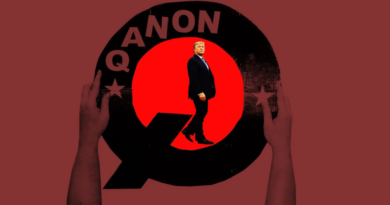Kash Patel Is the Hero QAnon Has Been Waiting For

QAnon—the conspiracy movement that claims Donald Trump is waging a secret war against the Deep State, which is protecting a group of Satan-worshipping pedophile elites who run Hollywood and the Democratic Party—has never been stronger.
Despite silence from the eponymous Q, a supposed government insider, for more than four years—there were several purported Q posts in 2022, but there is significant reason to question their authenticity—QAnon beliefs are now more widespread in American society than when Q posted their last unquestionably canonical “drop” on December 8, 2020. Believers also skew younger than is commonly supposed—22 percent of Americans aged 18 to 29 are believers, according to one survey, as opposed to 14 percent of those 65 or older.
On top of that, the movement’s hero, US president-elect Donald Trump, is about to return to the White House, and set to staff his administration with figures more than willing to embrace conspiracy theories like QAnon—none more so than his nominee for FBI director, Kash Patel, who has often boosted the movement.
Supporters of the movement can barely disguise their glee.
“I can’t wait for the STORM TO ARRIVE. 20 JANUARY 2025,” one supporter wrote on the Q-focused forum The Great Awakening last month. (The Storm, in QAnon cosmology, is an event when Trump will defeat the cabal, featuring mass arrests and public executions. Why it didn’t come during his first term as president is unclear.) Another user crowed, “Wednesday January 20th, 2025 ‘QANON’ returns,” failing to spot the fact that January 20 falls on a Monday next year.
QAnon has inspired multiple incidents of extremist violence in recent years—including playing a pivotal role in the January 6 attack on the Capitol—and experts now fear that the movement, boosted by Trump’s talk of retribution against his perceived enemies, could inspire further violence. And for family members who have lost loved ones to the conspiracy movement, the resurgence of QAnon is a grim reminder that those relationships may be lost forever.
“There’s a renewed sense of excitement, and even bloodlust, for ‘the Storm’ and all that’s prophesied to come with it,” Jesselyn Cook, a journalist and author of the book The Quiet Damage: QAnon and the Destruction of the American Family, tells WIRED. “Non-QAnon-believing loved ones, meanwhile, are losing hope that their relationships can be saved, or now fear that any progress that’s been made in bringing believers back to reality since Trump’s defeat in 2020 will be reversed.”
Q, the shadowy figure who inspired the QAnon movement, began posting on 4chan in late 2017, before moving to rival message board 8kun in early 2018. They posted a total of almost 5,000 so-called q-drops, which made wild, specific, and failed predictions, in addition to promoting the idea that Democratic elites like Hillary Clinton were kidnapping and terrorizing young children to trigger the production of adrenochrome in their systems before drinking their blood. (Among other issues with these false claims, adrenochrome can be inexpensively purchased from any chemical supply store.)
As the January 6 attack on the Capitol roiled the country, and the Stop the Steal movement inspired millions to lose faith in US democracy, Q remained silent. Even as Trump narrowly survived assassination attempts earlier this year, before roaring back to win the election last month, Q remained silent.
(It did look for a moment as if Q had returned in 2022, but the authenticity of the posts was disputed. According to independent analysis, the posts appeared to have been at least facilitated by Jim and Ron Watkins, the former pig farmer and his failed-Senate candidate son, respectively, who operate 8chan. Ron Watkins told WIRED he was “not involved in or interested in [QAnon] at all,” while Jim Watkins said he would fact-check the article after it was published but declined to provide comment.)
But while Q was silent, their wild claims and the conspiracy theories they prophesied slowly became mainstream Republican Party orthodoxy, helped by the ascent of figures like Marjorie Taylor Greene, the representative from Georgia who was among the very earliest promoters of QAnon back in late 2017.
And so, as 2024 comes to a close, belief in core QAnon conspiracy theories is more popular now than it was when Q fell silent, according to data from the Public Religion Research Institute (PRRI) and shared with WIRED. The data, which is based on a survey conducted after last month’s presidential election, shows that belief in the QAnon narratives has risen from 14 percent of the public in 2021 to 17 percent.
While there is no one-size-fits-all description for a QAnon supporter, PRRI’s post-election data shows that they are overwhelmingly likely to have voted for Trump (81 percent). The data also shows that QAnon believers are more likely to be evangelical Christians, and those who espouse Christian nationalist views are about three times more likely to embrace QAnon beliefs than those who reject or are skeptical of Christian nationalism.
And contrary to popular belief that QAnon adherents are typically older people with more time on their hands to spend on conspiracy websites, the PRRI data shows that 22 percent of those aged under 50 believe in QAnon conspiracy theories, compared to just 14 percent of those aged over 65.
“I don’t suspect belief in conspiracy theories such as QAnon will dissipate anytime soon,” Melissa Deckman, CEO of PRRI, tells WIRED. “Trump’s supporters in particular are already primed to support conspiracies not based in any fact at higher levels than the general public. Combined with historic levels of mistrust in government and a variety of other institutions among many Americans, the conditions that allow such theories to fester and even grow are sadly not going anywhere anytime soon.”
Trump’s return to the White House has been celebrated widely by the QAnon community, members of which believe that all of the wild predictions that Q made in their thousands of posts will now come true.
“The general agreement is that Trump is going to crush the Deep State and that all the evil libs are going to jail ASAP, that we’ll be back on the gold standard and the Fed will be destroyed,” Mike Rains, a researcher who closely tracks the QAnon community, tells WIRED. “The Ukrainian biolabs will be exposed as the source of Covid and [Anthony] Fauci and company will all be sentenced to death for crimes against humanity.”
This can be seen in the Telegram channels and fringe platforms like Gab and Truth Social, where QAnon influencers hunkered down in the wake of the mass purge of QAnon accounts on mainstream platforms in 2021 following the attack on the Capitol.
But it can increasingly also be seen on platforms like Facebook, Instagram, TikTok, and, most noticeably X, which has, since centibillionaire Elon Musk’s takeover, provided a fertile ground for the conspiracy to thrive, in addition to providing an income for influencers who can monetize their bullshit.
Meta, TikTok, and X did not respond to comments about QAnon content on their platforms.
“It certainly doesn’t help that under Musk, unevidenced QAnon conspiracy theories have flourished all over X, giving them a massive audience and a veneer of legitimacy,” Cook says.
Among those kicked off what was then called Twitter following the January 6 attack on the Capitol was Trump. Pushed to posting on his own tiny platform Truth Social, he quickly embraced QAnon wholeheartedly, promoting QAnon-linked accounts almost 1,000 times, according to an October analysis by Media Matters.
As Trump forms his new administration, there are multiple QAnon-linked figures and influencers in his orbit claiming they have insider knowledge of what is being planned. This includes Pizzagate promoter Ann Vandersteel, who claims to be in contact with “border czar” Tom Homan, who was also recently pictured at Mar-a-Lago with QAnon influencer Ben Moore. Conspiracy filmmaker Mikki Willis, who has embraced QAnon influencers, claims he is privy to “backroom conversations” about the transition team’s plans.
But aside from Trump’s return, the main driver of excitement among QAnon believers for what will happen in 2025 is the ascent of Kash Patel, a former Justice Department official who will soon run the FBI, if his nomination is confirmed by Congress.
“Kash Patel has openly praised Q,” an influential QAnon account with 600,000 followers wrote on X last month. “Picture an FBI Director who sees the Q movement in a positive light.”
Patel’s embrace of QAnon is not just limited to the odd obscure nod-and-wink on years-old social media posts. He has been actively engaged with the most red-pilled corners of the QAnon world.
Just six days before last month’s elections, while other Trump acolytes were appearing on mainstream television or high-profile podcasts, Patel logged on to an ultrafringe livestreaming platform called Pilled, home to many of the biggest QAnon influencers.
That day, he was appearing on a show called Deplorable Discussions, where he confidently told the hundreds of people listening, “The Deep State exists. It’s a Democratic-Republican uniparty swamp monster machine.” Patel also spoke about exposing details of long-held conspiracies, such as 9/11 and the JFK assassination, when Trump returned to the White House.
Over the years, Patel has not only mentioned QAnon in a positive manner, but has lauded its supporters, signed books with the QAnon slogan, and regularly promoted the @Q Truth Social account. Patel even published a “deep state” enemies list in a book he wrote; it includes the current director of the FBI, Christopher Wray. Patel was also name-checked by Q in two Q-drops.
Since January 2021, Patel has appeared on “at least 53 episodes of 13 podcasts that have overtly promoted the QAnon movement and/or shared QAnon-related conspiracy theories,” according to an analysis conducted for WIRED by researchers at Advance Democracy, a nonprofit organization that conducts public interest research.
“Kash Patel’s embrace of QAnon lasted over a significant period of time,” Alex Kaplan, senior researcher from Media Matters, who has closely documented Patel’s interactions with QAnon, tells WIRED. “His nomination for FBI director shows that QAnon’s growth over the years, thanks to social media, became extensive enough that public figures, or soon-to-be public officials, felt it could boost their profile.”
Patel did not respond to requests for comment about his QAnon beliefs and promotion.
“This is a pathetic attempt at guilt by association,” Alex Pfeiffer, a spokesperson for Trump’s transition team, tells WIRED. “Is WIRED going to claim next that Obama is a Kash Patel supporter because Kash was a terrorism prosecutor for the Obama administration?”
Now Patel is working hard to persuade senators on Capitol Hill to forget about his deep links to the QAnon conspiracy movement so that he can run the FBI, the very agency which has repeatedly warned about the threats of violence posed by those inspired by the QAnon conspiracy theory.
For the people whose loved ones have fallen down the QAnon rabbithole, they worry that Patel’s ascent will see their Q-pilled family and friends becoming even more distant and isolated.
“My Q cousin believes that Patel will release the Epstein island list,” one member of the QAnon Casualties subreddit tells WIRED. “And afterward everyone will be arrested, tried, and executed. She believes they will be public figures such as Oprah Winfrey, Tom Hanks, and Hunter Biden. She’s really looking forward to January. She’s also on the lookout for raw milk.”

